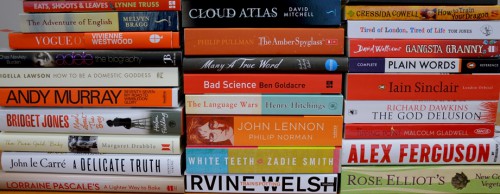7th February 2014
Bookish Britain
One of my favourite activities is to spend time browsing in a bookshop. When I was growing up, that was the most likely place I would go to when I visited our local town. I usually spent my pocket money on a book.
Reading is still very popular in Britain. Radio 4, the main national “talk” radio station, still has a daily 15 minute programme “Book at Bedtime” when instalments of a book are read by an actor every night of the week. In recent years, book groups or book clubs – where a group of friends meet on a regular basis to discuss a pre-chosen book – have become very popular.
Britain is full of second hand book shops, which sell all sorts of books, often for very little. One town, Hay-on-Wye, had so many second-hand bookshops, one owner came up with the idea of inviting authors to the town to talk about their books. Hence was born the literary festival. There are now well over 200 such festivals in Britain alone. The original Hay Festival has established a series of festivals all over the world.
What is it about Britons and their books?
Firstly, I think there is something about the physical nature of a book that is attractive.
For me, the smell of slightly musty paper in old books is very enticing. Then there’s the feel of the paper – there’s nothing like turning over the pages of a new book for the first time.
The look of a book is important – not just pictures on the cover, but also the typeface, and layout. A room is not complete without shelves full of books. As the writer of a series of novels chronicling the 20th century suggested in the title of one of his books, “books do furnish a room”.
Books represent two things.
They are a medium (until recently, the most important) of recording and passing on knowledge for mankind. So they can tell us about many things that we would never otherwise experience in our lives. And they can provide us with stories that entertain us, and that can even show what goes on in other people’s minds.
Britain has long been a very literate society. Thanks to the wealth and development generated by the industrial revolution, it was one of the first countries with mass literacy. In the 19th century a major market for reading emerged which was filled by new magazines and books, thus making the career of Dickens and other writers. We also established many public libraries, so that all people could gain access to the knowledge in books.
We are very much book lovers. So for Britons, book burning and other types of censorship are particularly abhorrent. We hate the idea of destroying knowledge and experience, or banning access to them. It was a group of British authors who first came together in 1921 to set up PEN, the organisation which supports the rights of authors to “unhampered transmission of thought within each nation and between all nations, and …. to oppose any form of suppression of freedom of expression”.
Publishing remains an important industry in Britain. Helped by the widespread use of the English language, we still publish the most new titles in Europe, and the highest number per head in the world. In 2010, the Publishers Association estimated that total sales of books were £3 billion.
That is changing. The world is going digital. People are now reading books on electronic readers and tablets. That’s not necessarily the end of publishing, but it’s changing dramatically how the industry works, and how it is financed.
Bookshops face increasing competition from on-line sales of books and increasing use of electronic e-books. There were 1,878 bookshops in Britain at the end of 2012, but that was less than half the total of 2005. Of these, around 1,000 were independent bookshops – individual shops, not part of a chain – of which there had been 1,535 in 2005.
To entice people into their shops, booksellers can’t simply have shelves full of books to sell. Many are adapting how they present books, by selling other goods, or providing other services. So the “browsing experience” even in bookshops is changing too.
Whether books will survive into the next generation is difficult to say. But there’s still a joy to be had in holding and reading paper with text and pictures, just as there was when Johannes Gutenburg began pressing books in the 15th century. There is something timeless and very comforting, in the feel of a book.
This is an extended version of a speech made at the opening of the Minsk Book Fair on 5 February, 2014.

“Book after book I get hooked everytime the writer talks to me like a friend…” ( Tennyson )
Dear Bruce ,
maybe 2 or 3 sentences written by you could also easily written by myself. I. e . : Right from the start the one ’bout yr. “favourite activities ” for if I ‘m once in a bookshop it might be getting hard for others to get me out of there again. Plus : When I was a teenager I don ‘t only spent my entire pocket money for buying books. I also “took over” some typicial teen-pupil jobs so I could afford some so – called “Complete Writings of…”. Unfotunately and in opposition to Great Britain – reading – books (and clubs ) are by far not so popular in Germany. More and more -the younger the badder -are spending their time by going online. Well,for me is also a room not complete without special furnitures . Only made for your own “private library”. To conclude : If books are representing a medium and provide us with stories they should also be read – again and again.
Best wishes, liebe Grüßle, Ingo-Steven